Women in Pro Audio: Amanda Davis Women in Pro Audio: Amanda Davis...
“There was something about studying audio that sparked something within me. I was having fun again. It was something new and cool, and I could still do music. I kept my head down, studied, and as they say, the rest is history.” – Amanda Davis
Each woman’s pro audio journey is unique, yet many carry similar themes: a love for music, what it creates, what it provides, and what it can restore. Music is that ubiquitous facet of our culture so intertwined with our emotions and human experience that it’s no wonder those who get involved professionally find purpose in their passion. And the wildly talented and driven Memphis-born front-of-house engineer Amanda Davis is certainly no different. “Music is my life!” she says.
Meet Amanda
As far as becoming a FOH engineer, Amanda had no idea the job even existed when she was younger. “I wanted to be a teacher when I was growing up. And, really, that’s all I knew because my big sister was a teacher, and I thought she was cool. So, in my mind, I just thought I’d do what my big sister does!” Actively involved in music most of her life, Amanda started taking piano lessons when she was around three or four years old, then started singing when she was 12.
“Once I started singing more and being more active in different performance opportunities in and outside of school, it was fun and opened my eyes to another world! Life continued, and I studied voice at Roosevelt University in Chicago. As I continued my education, I realized that pursuing a career as an opera singer wasn’t what I wanted to do with my life, but I had no idea what I actually wanted to do. After graduating from Roosevelt, I stayed in Chicago to pursue being a singer/actor. Ya, know, finding myself,” Amanda says with a laugh.
“Living in Chicago exposed me to many different facets of the industry, and I started to figure out my place there. I had a friend who attended Roosevelt with me who moved to Atlanta to attend SAE Institute. He was doing well, so I took a leap of faith, enrolled in SAE, and moved to ATL to study audio engineering. I knew NOTHING about audio. I thought I was going to learn some software so I could be a music producer. I was like a fish out of water! But there was something about studying audio that sparked something within me. I was having fun again. It was something new and cool, and I could still do music. I kept my head down, studied, and as they say, the rest is history.”
Putting in the Work
“I started professionally as a FOH engineer in the music industry in 2013 on Janelle Monáe’s Electric Lady Tour. Before that, I worked on a cruise ship as an audio tech, worked in clubs and churches in Atlanta, and interned at different studios after graduating from SAE. I just jumped in head-first! I have been blessed to have an uncomplicated journey. My struggles were of the normal variety. Although, I don’t want to diminish the weight of the journey because it’s not easy. You absolutely have to do the work. Being a successful professional at this level in the music industry is not a walk in the park. But I’m grateful that ‘struggle’ isn’t a word I would use when discussing my journey at this point in my life. With that said, nothing was handed to me; I’ve worked my butt off. I’m grateful to be on this rollercoaster and am still here for more rides until my path takes me elsewhere.”
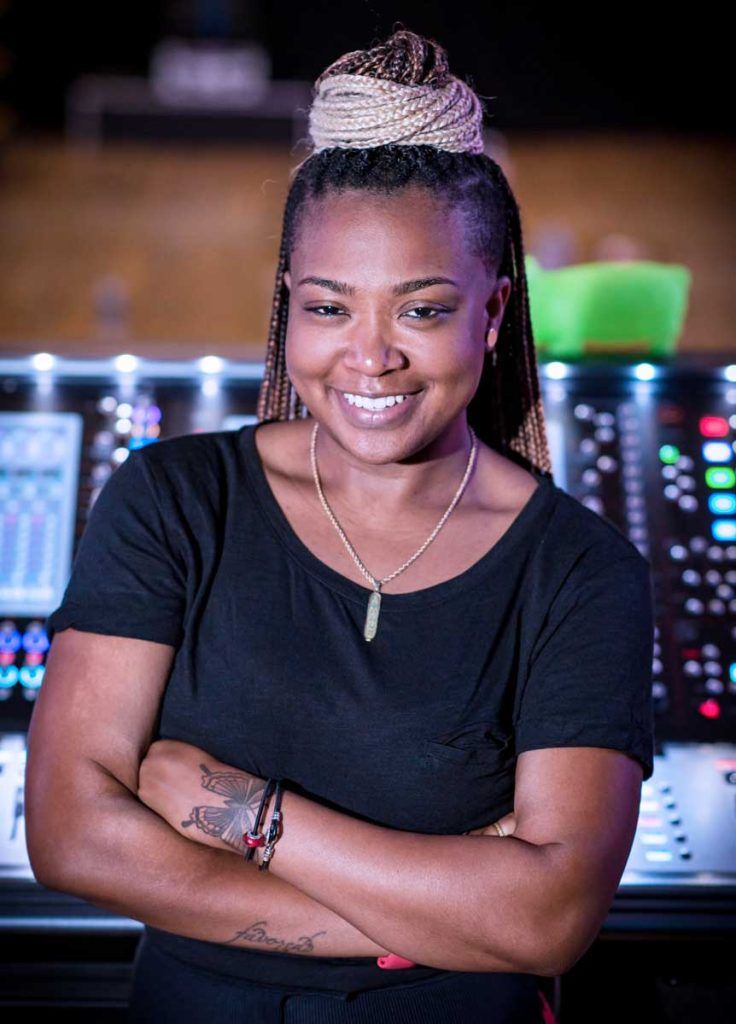
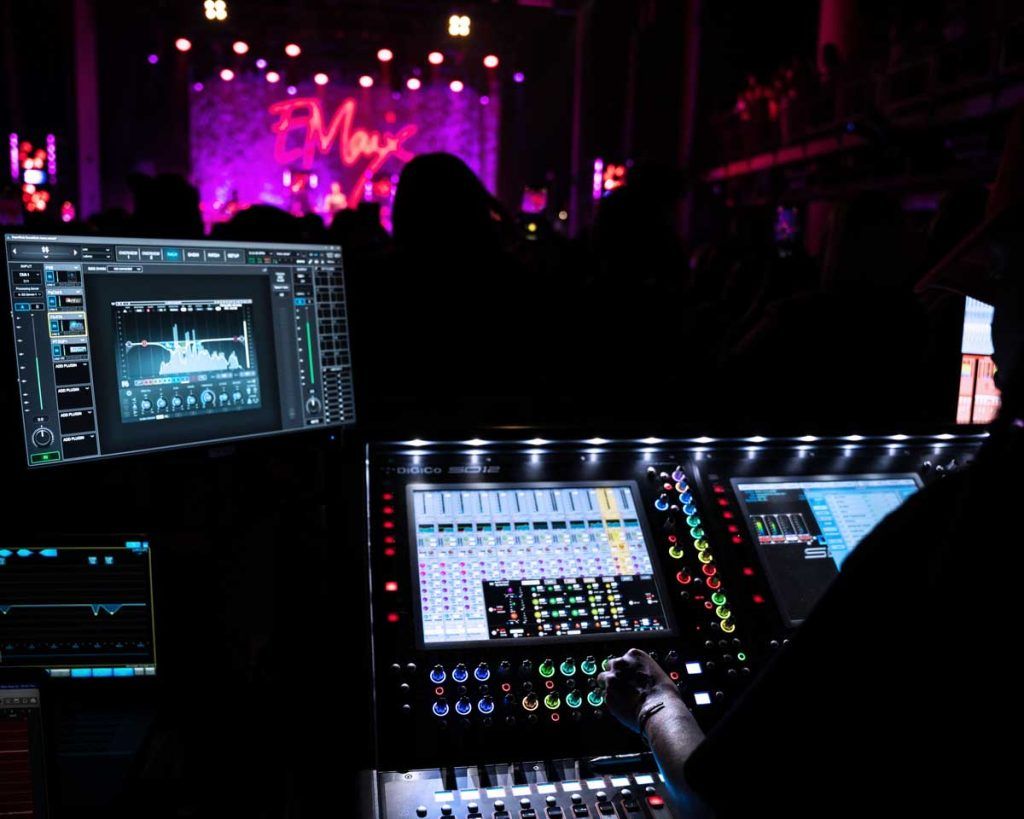
Challenges
When hitting challenges, Amanda advises, “You do what you must to get through it. But also, you have challenging people that you have to work with every day or challenges that are recurring. For example, when I’m on tour, I usually have one song in the set that I like to call my ‘problem child.’ It’s that one song in the show that I just can never make sound like I hear it in my head, so the challenge every night is to achieve my mix goal of this one song. In general, I try to be as reflective as possible so that I can be sure the challenge won’t happen again or if it’s something or someone I will continue to encounter, like the ‘problem child’ song, I’ll have a better handle on the best way to handle it.”
Most of the biggest challenges Amanda feels she’s faced have been internal, “Believing I belong. I often still struggle with imposter syndrome, but after I have my moment and talk with very supportive friends, I focus on the fact that my faith in God is more powerful. So, I press on toward the mark. Yes, there have been a few run-ins with ignorant people who take issue with my gender. When I encounter those people, I definitely stand up for myself and nip things in the bud. But my Mama has always taught me not to take on anyone else’s issues, especially if it’s about something out of my control. Whether I’m a woman or not, we still have a gig to do, and it’s not my responsibility to hold someone else’s hand through their issues with my gender. My POV is that I’m just here to mix shows; it’s not deep. Let’s just do the gig and have fun!”
Accolades
Some of Amanda’s standout events that she’s worked on were “The 4th of July Celebration at the White House for the Obama Administration, of course! That’s something I’ll never forget. Janelle opened the 92nd Academy Awards, and that was quite the experience. Even the preparation for that show was exciting! Being a part of multiple Grammy performances, mixing Prince twice when he joined Janelle on stage, and the Sydney Opera House with Ella Mai twice. I’ve been pretty blessed!”
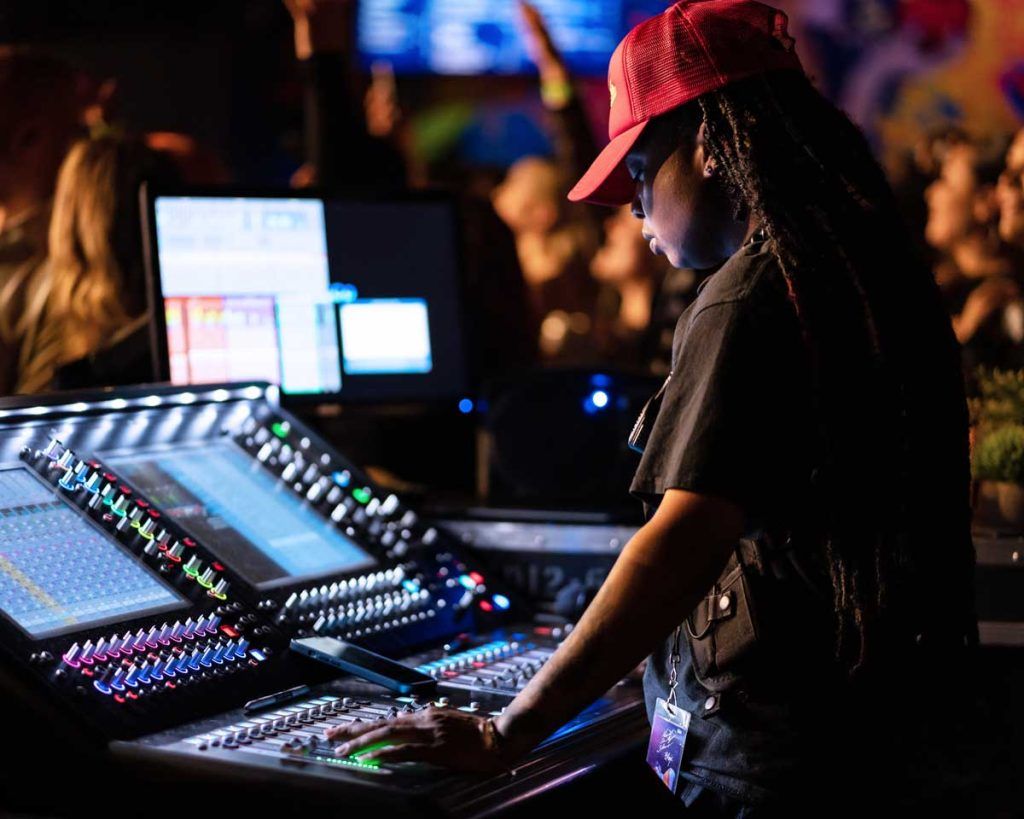
Visibility
When we asked Amanda why she thinks there aren’t as many women working in pro audio as men, she said, “Exposure. There’s way more visibility nowadays with social media and other mediums like this article, but it’s still about exposure and education. At face value, the appeal of the music industry isn’t the crew or people behind the scenes, so it takes some digging if you are a person who is interested in getting into the industry as a non-performing artist. I will say this industry isn’t for the faint of heart, so it takes a special type of woman to work in it. You have to be built for this; some people find it’s not their thing.”
Another perspective, Amanda notes, is that the people in the hiring positions could be more open-minded during their hiring process and provide opportunities to hard-working young women. “There are lots of opportunities out here, and it takes someone being open to hiring not just their friends for comfort but trusting that there are others just as qualified that could benefit from just one opportunity to show that they’re the person for the job. In my experience, there are lots of people doing the work to put women in those positions. I’m hopeful that the visibility and exposure will evolve even more and continue to expand the platform for women in this music industry sector.”
Advice
Regarding advice for working in this niche industry, Amanda says, “I think EVERYONE should focus on being nice, clearly communicating, and prioritizing the right things. And I advise other women to keep the main thing, the main thing. If you’re there to do audio, do the work and do it well. Also, always continue educating yourself. There’s no ‘you made it’ mark. There’s always something to learn and room to grow. And you should put those two things into practice while respecting yourself and others. And I advise not wearing your gender on your sleeve when encountering someone ignorant enough to take issue with your gender because it will all be revealed quickly and clearly, and you will know how to proceed.”
The best advice Amanda received was: “To be clear on the gigs I take, make sure the gigs align with the vision of where I see my career going. All money ain’t good money,” Amanda says emphatically, then adds jovially, “My Daddy will kill me for using that grammar, but it has to be said that way!”
Pro Tips
“I still watch videos of different studio mixing engineers to incorporate certain techniques and plug-ins into my workflow, and I am back to watching Pensado’s Place. I also have great colleagues! I am surrounded by more seasoned FOH and MON engineers who are very gracious with tips and tricks that elevate me and my mixes. Also, I’m not that old, but I try to stay in touch with younger engineers and musicians to know what’s new and learn from them. I recently had the opportunity to author a mixing course for Berklee Online. Having to put what I do on paper taught me A LOT! Explaining what I do in the educational space and teaching it really was a game changer in how I approach mixing.”
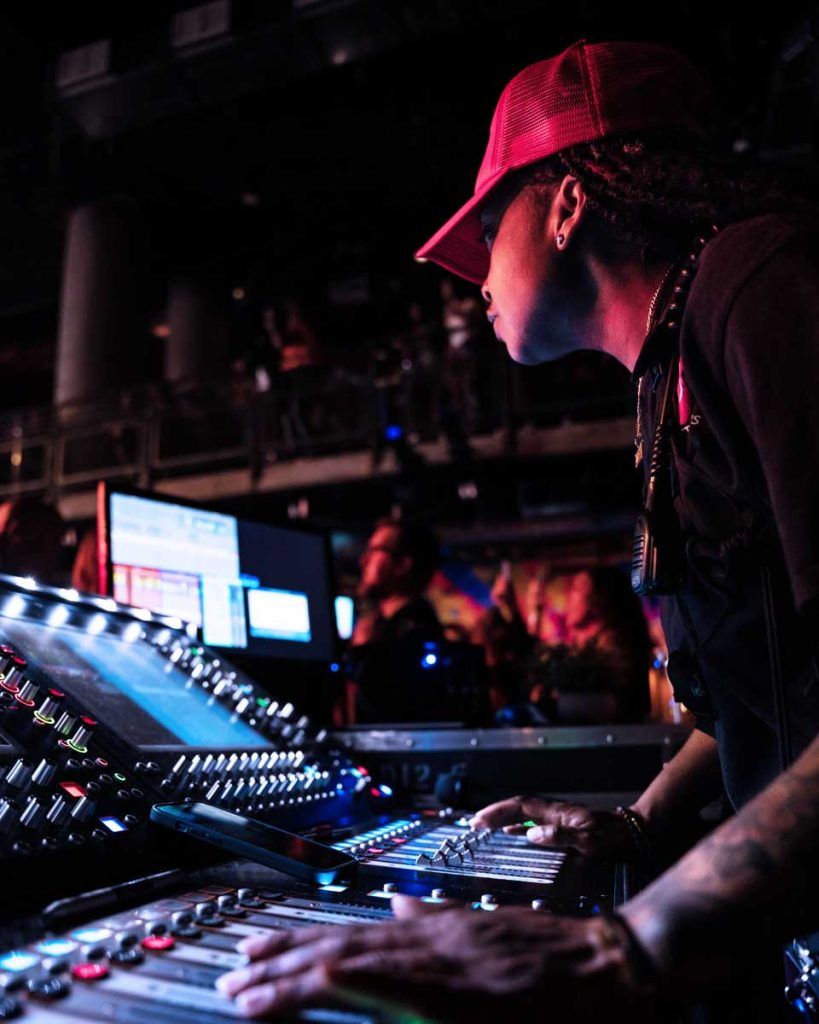
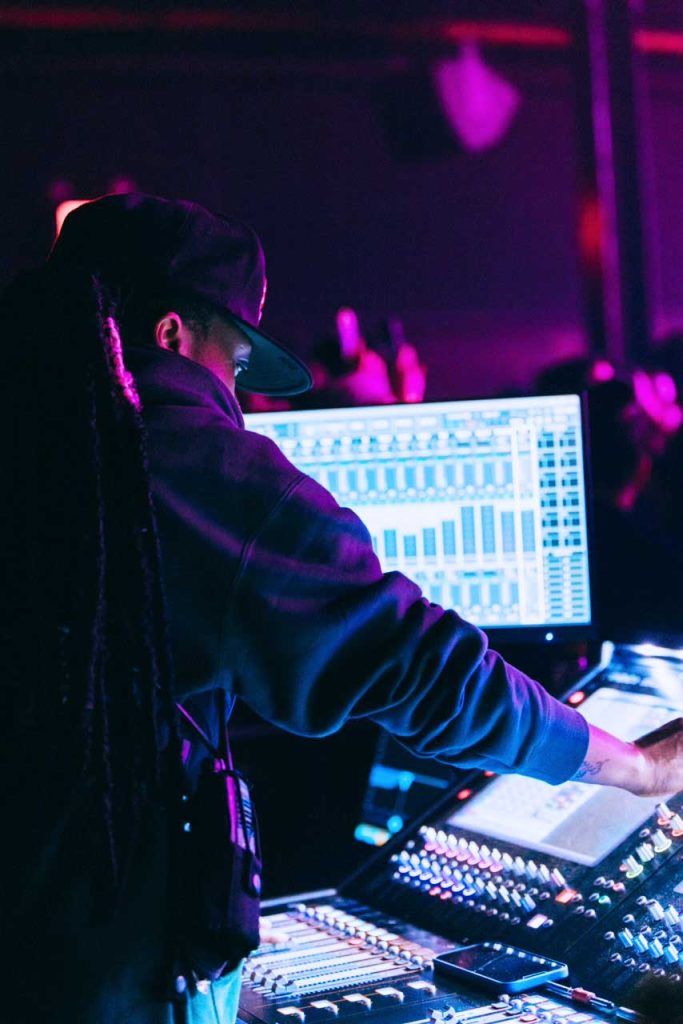
The Best Parts
“I actually get to see the show!” Amanda notes her favorite part about what she does. “The FOH engineer, LD, and VD are the only crew members who get to see the show. That’s really cool to me! Oh, and seeing the world, of course.”
One of Amanda’s proudest moments was during Coachella 2019. “I was on double-kind-of-triple duty. I was mixing Janelle Monáe and Ella Mai on two different stages, but I was also Ella’s production manager, so that’s why I say kind of triple duty. Anyway, their load-ins/sound checks were simultaneous, so I had to split myself in half. Because I was Ella’s PM, I did that load-in and the first half of her sound check. I asked my PM on Janelle to let me know as soon as she was headed to the stage so that I could run over and be there to start sound check when she got on stage.
“Because of issues on stage, I didn’t get a sound check with Janelle, and we were on the main stage, set before the headliner Childish Gambino and Ella’s set time ended at the start of Janelle’s changeover. I asked my MON engineer on Ella to help with things for the load out so I could run over to line check for Janelle since we didn’t get a sound check. I think I was too wired and tired to be nervous. I just went through the line check and thought, ‘I am about to play the main stage at Coachella, and I don’t know how this will sound when I open this PA.’ I just prayed, and my faith in God and myself kicked in DOUBLE TIME! I got the go for the show, opened up, and it was one of the best Janelle shows I’ve ever mixed. Both shows I mixed that night are some of my best work to date. Maybe it was the pressure; I don’t know. But when I returned to my hotel, I gave myself a pat on the back and affirmed that I do this.”
And according to Amanda, “The craziest thing IS that I get to mix shows for a living! That’s insane! Ha! I’ve mixed a show in Shonda Rhimes’ backyard before. That’s nuts, right? But that’s what this job will bring before you. “
The Future of Pro Audio
Regarding the future industry landscape, Amanda wants to see more opportunities for hands-on education for up-and-coming live sound engineers. “Or even people like myself who want to continue to learn but learn in a specific way. Mixing is about many concepts that can’t be explained by reading or watching a few videos. It takes practice and real-world application if you want to be great at it, and there’s a wall up in the live sector to get access to sit with someone and learn.”
Amanda mentions that there’s a lot of content on recording and mixing recorded music at a high level, but “That’s few and far between on the live, pro audio side. There are programs where you can learn gear prep and things like that. And there are a few programs on the church/worship experience side of things that produce great content! But there’s not a lot of access on the high, pop artist level on how to mix, build an efficient and effective show file, and tune your PA if you’re on a club/mid-size venue run…things like that. You have to know the right people, and that’s not cool for someone who’s new and sincerely just wants to learn.”
She continues, “I’m grateful for engineers like Andrew Thornton, Billie Eilish’s FOH engineer, who, during the pandemic, started a series called A Sum of Two Busses. He shared mixing techniques on that pop level, and it’s amazing information. He even started interviewing other FOH engineers to share their knowledge. It definitely helped me! So, I hope to see more of that content available for young engineers or anyone wanting to work in pro audio.”
And last but not least, when asked if there was one thing we could change about the industry, Amanda emphatically said, “We need an HR department! I don’t really know how to make that happen… But yeah. That.” Amanda says with a wink and a smile.